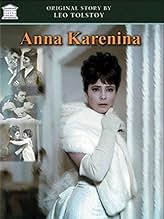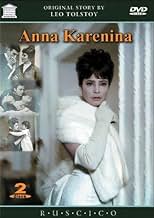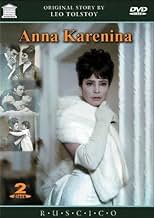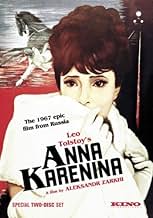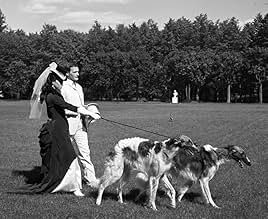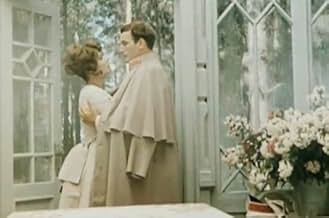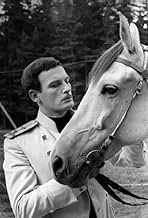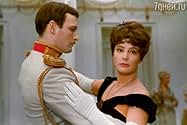CALIFICACIÓN DE IMDb
7.0/10
1.1 k
TU CALIFICACIÓN
Agrega una trama en tu idiomaAnna Karenina is a young wife of an older husband. She has an affair with the handsome Count Vronsky. By following her desires Anna complicates her life.Anna Karenina is a young wife of an older husband. She has an affair with the handsome Count Vronsky. By following her desires Anna complicates her life.Anna Karenina is a young wife of an older husband. She has an affair with the handsome Count Vronsky. By following her desires Anna complicates her life.
- Dirección
- Guionistas
- Elenco
Yuriy Yakovlev
- Stiva Oblonsky
- (as Yu. Yakovlev)
Boris Goldayev
- Konstantin Levin
- (as B. Goldayev)
Anastasiya Vertinskaya
- Kitty
- (as A. Vertinskaya)
Iya Savvina
- Dolly
- (as I. Savvina)
Maya Plisetskaya
- Knyagina Betsy
- (as M. Plisetskaya)
Lidiya Sukharevskaya
- Lidiya Ivanovna
- (as L. Sukharevskaya)
Elena Tyapkina
- Knyagina Myagkaya
- (as Ye. Tyapkina)
Sofiya Pilyavskaya
- Grafina Vronskaya
- (as S. Pilyavskaya)
Andrey Tutyshkin
- Lawyer
- (as A. Tutishkin)
Vasili Sakhnovsky
- Seryozha
- (as Vasya Sakhnovsky)
Anatoliy Kubatskiy
- Camerdiner Kapitonich
- (as A. Kubatsky)
- Dirección
- Guionistas
- Todo el elenco y el equipo
- Producción, taquilla y más en IMDbPro
Opiniones destacadas
Anna Karenina by Leon Tolstoy is the best novel I have ever read. I have seen a few movies based on it, but the best one on my opinion is that old version with Samoilova, Lanovoy, Vertinskaya and of course the amazing Maya Plissetskaya. What a wonderful cast! For me, Samoilova is the closest physically to Anna's character and for that, I can forgive the gossips about the influence of her father in obtaining this role. The movie is great and until now, 2005, nobody can beat it. Even taking into account the dark ages when this movie was done, it it regretful that it is not known enough throughout the world. I just keep hoping that it will be screened again at least on TV.
I think that Aleksandr Zarkhi's adaptation of Leo Tolstoy's famous novel "Anna Karenina" is one of the best screen versions of the book. It was filmed on the locations where the novel's events took place, its characters speak in the original language, and the spirit of the book was successfully transferred to the screen mostly due to the performances and the cinematography by Leonid Kalashnikov.
Tatiana Samoylova (radiant Veronica of "The Cranes Are Flying") plays Anna exactly as Leo Tolstoy had intended her to be, a victim of overwhelming passion, a woman who had lost herself to love, for whom the whole world had concentrated in her beloved Alexei Vronskiy, and once she felt he had became tired of her, she simply could not and did not want to live. The world famous Soviet ballerina, Maya Plisetskaya took a role of Anna's friend, Princess Betsy Tverskaya and just to see her walk is worth watching the movie. There is much more in it. Some scenes are unforgettable after so many years. Among them, the Vronsky's horse race with the rapid cuts from the faces to horses' heads scene that has to be seen to believe; the first dance of Anna and Vronsky - during the dance the lives of many people had changed forever, or the scene in the theater where Anna dared to show up after she had left her husband and moved in with Vronsky. For a woman of her social position, it was absolutely shocking and totally unforgiving. She was crucified with the looks of the St. Petersburg's Aristocracy but she was standing on the balcony all alone, beautiful and smiling and no one knew what she was going through.
The original music for the film was written by Rodion Shchedrin who would write later the ballet based on "Anna Karenina" and his wife, Maya Plisetskaya will be dancing Anna - but it is a different story altogether
Tatiana Samoylova (radiant Veronica of "The Cranes Are Flying") plays Anna exactly as Leo Tolstoy had intended her to be, a victim of overwhelming passion, a woman who had lost herself to love, for whom the whole world had concentrated in her beloved Alexei Vronskiy, and once she felt he had became tired of her, she simply could not and did not want to live. The world famous Soviet ballerina, Maya Plisetskaya took a role of Anna's friend, Princess Betsy Tverskaya and just to see her walk is worth watching the movie. There is much more in it. Some scenes are unforgettable after so many years. Among them, the Vronsky's horse race with the rapid cuts from the faces to horses' heads scene that has to be seen to believe; the first dance of Anna and Vronsky - during the dance the lives of many people had changed forever, or the scene in the theater where Anna dared to show up after she had left her husband and moved in with Vronsky. For a woman of her social position, it was absolutely shocking and totally unforgiving. She was crucified with the looks of the St. Petersburg's Aristocracy but she was standing on the balcony all alone, beautiful and smiling and no one knew what she was going through.
The original music for the film was written by Rodion Shchedrin who would write later the ballet based on "Anna Karenina" and his wife, Maya Plisetskaya will be dancing Anna - but it is a different story altogether
Previous to seeing this, the best version was Greta Garbo's with Vivien Leigh's close behind, while the Joe Wright-directed adapted fared least. Tolstoy's Anna Karenina is one of the greats of all Russian literature, and while this 1967 Russian version is not quite perfect and not for all tastes it does a great job with the story and gets closer than most of the other adaptations in capturing the detail and the spirit of the work, rather than just being the basic details in Cliff Notes version.
Some of the editing is a little abrupt in places and Anna and Vronsky seemed to fall in love too quickly, as if there was intended to be a few scenes in the film explaining Vronsky's infatuation that was cut out when it shouldn't have been. The print that the film comes in on the DVD is rather questionable, the constant colour shifts, the fading in and out, the washed out look and compression indicating a print that was badly damaged in the transfer.
Anna Karenina (1967) is, generally, visually well-made. The film contains some really striking cinematography, especially in the wonderfully delirious horse race scene and the tracking shots that allows one to admire all those splendid rooms and interiors in all their glory, haunting use of colour and 1860s Russia is evoked brilliantly in the truly sumptuous period detail. Rodion Shchedrin's music score is not for all tastes admittedly (with a few of the more dissonant parts a touch shrill), but this viewer found it beautiful and effectively chilling, the horse race and ballroom scenes being particularly well-scored.
The script is very literate and remarkably nuanced, capturing the spirit of Tolstoy's prose better than the other filmed versions. In terms of faithfulness, there could have been more with Anna and Vronsky's infatuation and descent into love, Levin is present but we don't get a sense of why he is so important a character and Levin and Kitty's subplot deserved better than being mentioned briefly. Other than those things though, this film is one of the more faithful, in detail and spirit, treatments of the book and despite the somewhat short length it has more depth than most of the other adaptations. There are some unforgettable scenes here, the horse race certainly is one but one cannot mention the very romantic ballroom scene, the scene in the theatre and the heart-wrenching suicide scene. The characters are still interesting, and the important parts of the story covered well, not just being a genuinely poignant love story but also a tense and unbearably tragic social drama too (one of the few Anna Karenina adaptations to achieve that balance).
The performances are uniformly good, with Tatyana Samoylova making for a very heartfelt Anna and bringing many nuances to the part in a way that was achieved by Garbo and not quite as much by the others. Vasily Lanovoy is a dashing Vronsky, but manages to bring depth to him, instead of being just a handsome heroic figure he is pretty un-heroic and unsympathetic actually. And there has unlikely been a more haunting Karenin on film than that of Nikolai Gritsenko. Yuri Yakovlev is amusing as Stiva, and Maya Plisetskaya (one of the greatest ballerinas of her day and of all time and wife of the film's composer Rodion Shchedrin) is a terrific Betsy.
In conclusion, imperfect but very good film, and compares extremely favourably with the rest of the Anna Karenina adaptations. 8/10 Bethany Cox
Some of the editing is a little abrupt in places and Anna and Vronsky seemed to fall in love too quickly, as if there was intended to be a few scenes in the film explaining Vronsky's infatuation that was cut out when it shouldn't have been. The print that the film comes in on the DVD is rather questionable, the constant colour shifts, the fading in and out, the washed out look and compression indicating a print that was badly damaged in the transfer.
Anna Karenina (1967) is, generally, visually well-made. The film contains some really striking cinematography, especially in the wonderfully delirious horse race scene and the tracking shots that allows one to admire all those splendid rooms and interiors in all their glory, haunting use of colour and 1860s Russia is evoked brilliantly in the truly sumptuous period detail. Rodion Shchedrin's music score is not for all tastes admittedly (with a few of the more dissonant parts a touch shrill), but this viewer found it beautiful and effectively chilling, the horse race and ballroom scenes being particularly well-scored.
The script is very literate and remarkably nuanced, capturing the spirit of Tolstoy's prose better than the other filmed versions. In terms of faithfulness, there could have been more with Anna and Vronsky's infatuation and descent into love, Levin is present but we don't get a sense of why he is so important a character and Levin and Kitty's subplot deserved better than being mentioned briefly. Other than those things though, this film is one of the more faithful, in detail and spirit, treatments of the book and despite the somewhat short length it has more depth than most of the other adaptations. There are some unforgettable scenes here, the horse race certainly is one but one cannot mention the very romantic ballroom scene, the scene in the theatre and the heart-wrenching suicide scene. The characters are still interesting, and the important parts of the story covered well, not just being a genuinely poignant love story but also a tense and unbearably tragic social drama too (one of the few Anna Karenina adaptations to achieve that balance).
The performances are uniformly good, with Tatyana Samoylova making for a very heartfelt Anna and bringing many nuances to the part in a way that was achieved by Garbo and not quite as much by the others. Vasily Lanovoy is a dashing Vronsky, but manages to bring depth to him, instead of being just a handsome heroic figure he is pretty un-heroic and unsympathetic actually. And there has unlikely been a more haunting Karenin on film than that of Nikolai Gritsenko. Yuri Yakovlev is amusing as Stiva, and Maya Plisetskaya (one of the greatest ballerinas of her day and of all time and wife of the film's composer Rodion Shchedrin) is a terrific Betsy.
In conclusion, imperfect but very good film, and compares extremely favourably with the rest of the Anna Karenina adaptations. 8/10 Bethany Cox
for a part of its public, the best adaptation of the novel of Tolstoy. for me, one of good adaptation for the performance of Nikolai Gritsenko, who does a memorable Karenin and for Maya Plisetskaya. for few admirable scenes. for music. Tatyana Samoilova does a decent job. but she seems be prisoner of Veronika. and that fact becomes obvious scene by scene. she gives fragments from the image of Karenina. but the identification with the character seems be more than difficult. something missing. something impose to entire film to be out of psychology of her character. only her silhouette. sure, it is a beautiful film. but it is not the film of Samoilova. because she took , in real sense , the role in few scenes - first meeting with Vronsky, the dance with him, the dialogues with Karenin, the last meeting with Serioja. same situation for the too far by his character for Vasili Lanovoy. short, a beautiful adaptation. but its beauty is the only great virtue.
Whoever cast Tatyana Samojlova as Anna has some explaining to do. This film would be beautiful if it weren't for the star, who completely ruins every scene she's in. She is a terrible actress and her unattractiveness is a serious problem, as we are supposed to love Anna's grace and beauty. This is why her character is so tragic: this great beauty married to an old bore - we're supposed to understand why she follows her heart and goes for Vronsky, and even sort of root for her, believing she deserves her 'grand amour.' None of this comes through as you just hate Anna and her gigantic head. The film is ruined. Nepotistic casting at its most pernicious!
¿Sabías que…?
- TriviaFinal film of Lyudmila Semyonova.
Selecciones populares
Inicia sesión para calificar y agrega a la lista de videos para obtener recomendaciones personalizadas
- How long is Anna Karenina?Con tecnología de Alexa
Detalles
- Tiempo de ejecución2 horas 25 minutos
- Relación de aspecto
- 2.20 : 1
Contribuir a esta página
Sugiere una edición o agrega el contenido que falta

Principales brechas de datos
By what name was Ana Karenina (1967) officially released in Canada in English?
Responda
